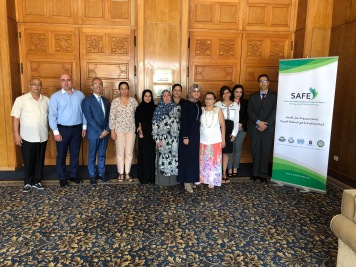Tunis, 19 July 2018 – The Expert Working Group on Food Safety Risk Assessment for the Arab Region, concluded its 2-day meeting in Tunis, Tunisia with participation from Algeria, Jordan, Lebanon, Morocco, Qatar and Tunisia.

This working group, chaired by Morocco, was struck and has been active since December 2016 under the auspices of the Arab Food Safety Initiative for Trade Facilitation (SAFE), implemented by the United Nations Industrial Development Organization (UNIDO) and funded by the Government of Sweden. It aims at developing a food safety risk assessment capacity for the Arab region, to support increased alignment in food regulatory measures between food regulators in the region, as a result of the adoption of science-based decisions.
 Meeting participants examined the risk assessment training program to be delivered, as part of SAFE and developed recommendations for its implementation. The EWG also agreed to continue the development of collaborative initiatives in risk assessment capacity building with European food risk assessment institutions such as the European Food Safety Authority (EFSA), the German Federal Institute for Risk Assessment (BfR), the Food Safety Authority of Ireland (FSAI) etc..
Meeting participants examined the risk assessment training program to be delivered, as part of SAFE and developed recommendations for its implementation. The EWG also agreed to continue the development of collaborative initiatives in risk assessment capacity building with European food risk assessment institutions such as the European Food Safety Authority (EFSA), the German Federal Institute for Risk Assessment (BfR), the Food Safety Authority of Ireland (FSAI) etc..
Arab experts reviewed the pilot risk assessment studies to be undertaken in the Arab region, throughout the upcoming year and agreed on their scope: “Salmonella in Broiler chicken”, “Aflatoxins in the Arab diet” and “Ochratoxin A in cereal-derived foods”. The requirements for the calls for data to support these studies were finalized with the aim to attempt to capture as much food occurrence and exposure information as possible from food authorities and academic organizations in the Arab region.
Experts discussed efforts to bolster the food safety risk assessment capacity throughout the Arab region and enable it with the required baseline information for sustainability of investments. A recommendation was made to initiate the development of food consumption data in various Arab sub-regions. At a time where a number of food safety regulatory authorities are initiating this effort, the EWG recommended that SAFE guides this effort with the development of a common set of requirements including an agreed-upon food categorization system as well as guidelines for the implementation of data collection, to enable opportunities of seamless data sharing and the possibility of use of such data throughout the Arab region. Participants reiterated the importance of risk assessment as a key foundation of robust food safety regulatory decisions and the need to further broadening of risk assessment capacity amongst food safety regulators in the Arab region.

The Arab Risk Assessment Initiative is one of the key initiatives implemented as part of the Arab Food Safety Initiative for Trade Facilitation (SAFE): arabsafetrade.org
The Arab Food Safety Initiative for Trade Facilitation (SAFE) is a capacity building project financed by the Swedish International Development Agency (Sida), implemented by the United Nations Industrial Development Organization (UNIDO) in collaboration with the League of Arab States (LAS), the Arab Industrial Development and Mining Organization (AIDMO) and the Arab Organization for Agricultural Development (AOAD)









